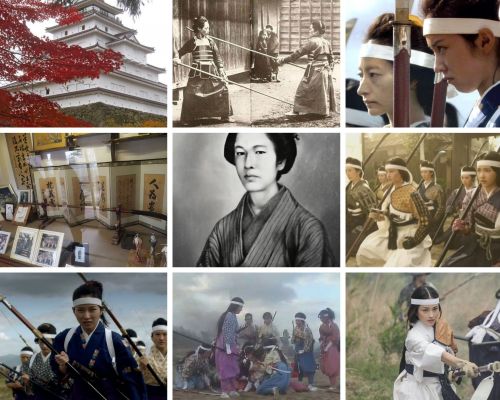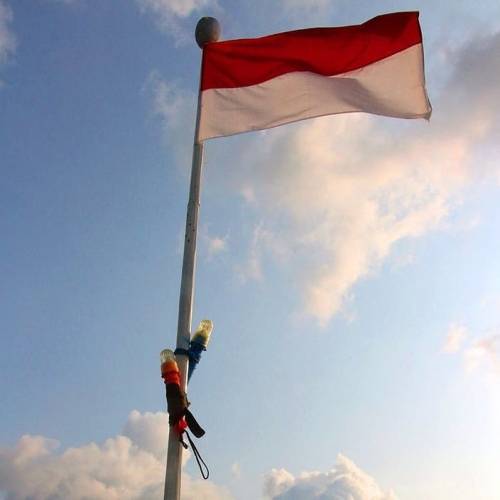Nakano Takeko - The Swan Song Of Samurai Warrior Women

Nakano Takeko - The swan song of samurai warrior women
In 1868, Japan was facing drastic political changes. The arrival of American ships in 1853 forced a country who had been closed to foreigners for the last two centuries to open. This led a to movement of distrust toward the Tokugawa shogunate and culminated in the restoration of the emperor’s power.
Some clans and domains didn’t accept this situation and stayed loyal to the shogunate. Such was the case with the Matsudaira of Aizu. In autumn 1868, Aizu came under attack by the imperial troops. Aizu was a conservative domain, its warriors strictly followed the samurai traditions. The women were trained with the naginata and to knew how to use a dagger for ritual suicide or self-defense.
When the imperial troops arrived, some women decided to commit suicide, taking with them their children or elderly relatives to avoid being a burden for the defenders or fearing capture. A woman named Kawahara Asako beheaded her daughter and stepmother before taking her naginata to fight against the invaders. She survived her first sortie and was ultimately forced to withdraw to the castle.
Other women decided to fight, and one of them was Nakano Takeko (1847-1868). Takeko was 22 when the battle began. The daughter of an Aizu councilor, she excelled in martial arts, poetry and calligraphy. On October 8, the alarm bell rang as the enemy managed to enter the town. Takeko immediately joined, with her mother, Kôko, and her 16 years old sister Masako (also sometimes called Yûko), a group made of men and women to fight the intruders.
The defenders, however, decided to close the castle gates and the three women found themselves blocked outside. They decided to join the outpost were the Aizu soldiers were stationed and were joined on the way by other women. Each of them had decided to cut their hair like a male samurai. They wore a white headband and a hakama. They had two swords at their belts and were armed with a naginata.
Between 20 and 30 women ultimately joined was later called the joshigun or “women’s unit”. Takeko went to the leader of a squad of Aizu soldiers and asked to be allowed to fight. He refused at first, arguing that if the enemy saw women among the Aizu soldiers, they would think that the domain was on the verge of defeat. Takeko then threatened to commit suicide if she wasn’t allowed to fight. She and the other women were placed under commander Furuya who ultimately accepted their demand.
The next day, the Aizu forces and the joshigun, attacked the imperial troops at Yanagi bridge, hoping to break through and go back to the castle. The women were unafraid, even if they had to charge at men equipped with firearms. When the enemies saw that they were women, they gave at first the order to capture them alive.
Takeko killed 5 or 6 men with her naginata, but was shot in the head and/or in the heart and died. Her younger sister didn’t want Takeko’s head to be taken by the enemy as a trophy. She thus tried to cut it, but couldn’t do it and asked an Aizu soldier for help. Masako managed to bring her sister’s head to Hokkai-ji temple where it was buried.
On October 13, the surviving women arrived to the castle with Hirata Kochô as their leader. They kept fighting and force some of them participated in the defense as sharpshooters.
Masako was among the members of the joshigun who survived the castle’s fall. She went afterward went to Hakkodate, Hokkaido.
Today, Takeko’s naginata is kept at Hokkai-ji. A statue as been erected in her honor in the town of Aizu. Each year, young women play the role of the jôshigun at the Aizu festival.
Takeko’s death poem, that she had tied to her naginata, was:
“I would not dare to count myself among all the famous warriors - even though I share the same brave heart”.
She was among the last samurai warrior women. Women took arms during the 1877 Satsuma rebellion to prevent the samurai status’ and privileges from being abolished, but to no avail.
Here’s the link to my Ko-Fi if you want to support me.
Sources:
Shiba Gorô, Remembering Aizu: the testament of Shiba Gorô
“Samurai warrior queens” documentary
Wright Diana E., “Female combatants and Japan’s Meiji restauration: the case of Aizu “
Yamakawa Kikue, Women of the Mito domain
More Posts from Hizrah and Others

Dimanakah Aku????😑😶... pura-pura gak liat lah😌
Dia pikir dia itu cancorang x, bisa nyaru jadi daon😏...kucing
When money can buy your happiness, then what happiness means to you ?
Then you absolutely knows, who's will make you suffer.
by. hizrah saputra


Menu buka puasa🤣🤣🤣
Lagi laper ape juga enak lah😂😂😂
stuck on my mind
i almost don't feel anybody around me
it's like i was own my own
"when i was felt down"
haaaahh😑..dengerin ini apa kata gw
gw ga pernah butuh lo care, like, love, fame atau semacam nya...serius' gw ga butuh itu dan gw juga ga cari itu.
mungkin mereka benar, mereka yg menceritakan keburukan gw
dan mereka sepenuh nya ga selalu benar, mereka yg menceritakan kebaikan tentang gw, karena kebanyakan orang terlalu melebihkan sesuatu hanya untuk bahan "good talking or good news"
lo ga perlu menyelidiki semua kebenaran tentang gw, karena gw orang yg ga penting' buat apa?? ada untungnya buat lo??
dan bagi gw semua hal berbau gossip itu cuma sekumpulan manusia yg ga tau apa apa tapi serasa tau segalanya....hmmm..hebat hebat hebat...
jadi bagi gw buat apa gw marah atau kesel...buang buang energi gw aj...lewat..busssshhh
lo pernah ngerasain angin bertiup keseluruh tubuh lo, seperti saat lo mengendarai sepeda lo sangat kencang...hemmmm...coba tutup mata lo saat itu..rasakan...hemmm..yeah itu kebebasan lo...no shit people bothering lo, no asshole knock kuping lo... moment itu milik lo
gw akan mainin skateboard gw, swing...swing..swing..swing...apa gw merasa kebencian saat gw main skateboard gw atau marah....hah...nope...more than billions % no...gw sempurna, cuma gw dan skateboard gw, ga da yg lain..
ini hidup gw...suka ga suka...ini gw

Baca😄... power.."semua orang baik, tapi jika lo mau menguji kebaikan seseorang..berikan dia kekuasaan" kutipan Abraham Lincoln..setuju gw🤣

THR sudah di tangan...
Alhamdulillah

Berusaha melepas...
KENTUT💨AHHHHHH

Kerja

"Al Fatihah" bismillāhir-raḥmānir-raḥīm al-ḥamdu lillāhi rabbil-'ālamīn ar-raḥmānir-raḥīm māliki yaumid-dīn iyyāka na'budu wa iyyāka nasta'īn ihdinaṣ-ṣirāṭal-mustaqīm ṣirāṭallażīna an'amta 'alaihim gairil-magḍụbi 'alaihim wa laḍ-ḍāllīn https://www.instagram.com/p/CKD_NVUHPac92-5OTJFsvIUqtSNumpOVrC7_cA0/?igshid=1mw34oojgmjnx
-
 unknown-cold liked this · 11 months ago
unknown-cold liked this · 11 months ago -
 kunst18 liked this · 1 year ago
kunst18 liked this · 1 year ago -
 flappywoblover liked this · 1 year ago
flappywoblover liked this · 1 year ago -
 cosplayhanna reblogged this · 1 year ago
cosplayhanna reblogged this · 1 year ago -
 yenoodlethings liked this · 1 year ago
yenoodlethings liked this · 1 year ago -
 noura-addams liked this · 1 year ago
noura-addams liked this · 1 year ago -
 histoire-de liked this · 1 year ago
histoire-de liked this · 1 year ago -
 petiteredlady reblogged this · 1 year ago
petiteredlady reblogged this · 1 year ago -
 sakuraaeris1497 liked this · 1 year ago
sakuraaeris1497 liked this · 1 year ago -
 thomas-jordan liked this · 1 year ago
thomas-jordan liked this · 1 year ago -
 blossomsinthemist liked this · 1 year ago
blossomsinthemist liked this · 1 year ago -
 carissima-amata liked this · 2 years ago
carissima-amata liked this · 2 years ago -
 i-love-books-because-reasons liked this · 2 years ago
i-love-books-because-reasons liked this · 2 years ago -
 scarl3tto-hara reblogged this · 2 years ago
scarl3tto-hara reblogged this · 2 years ago -
 this-is-mycrisis liked this · 2 years ago
this-is-mycrisis liked this · 2 years ago -
 worthington-smyth reblogged this · 2 years ago
worthington-smyth reblogged this · 2 years ago -
 cameron200 liked this · 2 years ago
cameron200 liked this · 2 years ago -
 amanlikehimher liked this · 2 years ago
amanlikehimher liked this · 2 years ago -
 loupsgarou liked this · 2 years ago
loupsgarou liked this · 2 years ago -
 chemitaromance reblogged this · 2 years ago
chemitaromance reblogged this · 2 years ago -
 raccoonwarlock reblogged this · 2 years ago
raccoonwarlock reblogged this · 2 years ago -
 nervousyouthwolf liked this · 2 years ago
nervousyouthwolf liked this · 2 years ago -
 mochibabyyy liked this · 2 years ago
mochibabyyy liked this · 2 years ago -
 abookyettobenamed liked this · 2 years ago
abookyettobenamed liked this · 2 years ago -
 cheloneuniverse liked this · 2 years ago
cheloneuniverse liked this · 2 years ago -
 esoteric-antimetabole liked this · 2 years ago
esoteric-antimetabole liked this · 2 years ago -
 priapocalypse liked this · 2 years ago
priapocalypse liked this · 2 years ago -
 sptfish12 liked this · 2 years ago
sptfish12 liked this · 2 years ago -
 thewhitedoor liked this · 2 years ago
thewhitedoor liked this · 2 years ago -
 nyxblessed liked this · 2 years ago
nyxblessed liked this · 2 years ago -
 kramagee liked this · 2 years ago
kramagee liked this · 2 years ago -
 satlano liked this · 2 years ago
satlano liked this · 2 years ago -
 awash2004 liked this · 2 years ago
awash2004 liked this · 2 years ago -
 crookedmouth-mountainbones liked this · 2 years ago
crookedmouth-mountainbones liked this · 2 years ago -
 petrichorparacosm liked this · 2 years ago
petrichorparacosm liked this · 2 years ago -
 bluekappa liked this · 2 years ago
bluekappa liked this · 2 years ago -
 davionsdreamooc liked this · 3 years ago
davionsdreamooc liked this · 3 years ago -
 elusiveladydjinn reblogged this · 3 years ago
elusiveladydjinn reblogged this · 3 years ago -
 elusiveladydjinn liked this · 3 years ago
elusiveladydjinn liked this · 3 years ago -
 unstoppablecass liked this · 3 years ago
unstoppablecass liked this · 3 years ago -
 those-amber-eyes liked this · 3 years ago
those-amber-eyes liked this · 3 years ago -
 mellodrama21 liked this · 3 years ago
mellodrama21 liked this · 3 years ago -
 32925 liked this · 3 years ago
32925 liked this · 3 years ago
